
|
|
The history of the Dutch band Lady Lake has always had a solid link with the ancient town of Deventer. Nearly all the bandmembers grew up there and had their first musical experiences in one of the many schoolbands existing during the early seventies. The year 1973 marks the birth of Lady Lake, named after a more or less obscure album by a London based rock band named Gnidrolog, nowadays very much appreciated by progressive rock lovers. In the late nineties the Internet brought the two bands together. They became good friends and eventually ended up on stage together in 1999. More about this very special event later. Lady Lake derived from a bluesband called Session: during a gig at "The Bottle", a rather memorable Deventer venue, Session changed their name into Lady Lake for the second part of their show. |
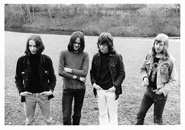
|
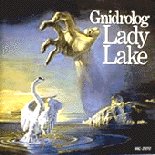
|
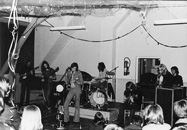
|
| L to R: Session, Gnidrolog's Lady Lake album cover, LL Mk I in concert |
 |
|
The first line-up consisted of an indecently young Fred Rosenkamp (guitar), Toon Heisterkamp (guitar), Ronnie Breurman (bass), Hans van Bockel (guitar), Gerbert de Ruiter (sax, flute, guitar) and Peter Schoemaker (drums). At several special occasions Gerard de Braconnier (guitar) joined Lady Lake I. Opinions differ about the musical direction in which this line-up headed; from psychedelic rock to symphonic rock. Nobody really remembers and it is, of course, of no real importance. This episode also marked the start of the longlasting cooperation with Aart (sound) and Peter (lights) van de Water (The H2O Bros.). Lady Lake I quietly ceased to exist in 1974. Gerard de Braconier later became one of the founders of Toontje Lager, one of Holland's most popular Dutch Wave bands in the eighties. |
 |
|
That same year, Willem Molenaar (bass), Leendert Korstanje (keyboards) and Jan Dubbe (drums) formed a band called DELAY, a name inspired by the many roadsigns Willem encountered during his long stay at a teacher training college in Norwich (U.K.).
RELAY, being the originally intended name, was replaced by DELAY, after Yes released their impressive "Relayer" album that winter. DELAY did quite a lot of gigs at schools and youth clubs in the eastern part of Holland. The band played original compositions only, which could be listed under experimental rock-music, comparable to Soft Machine and Caravan, or "The Canterbury Scene", as it is known nowadays. |
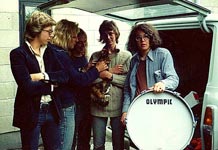 |
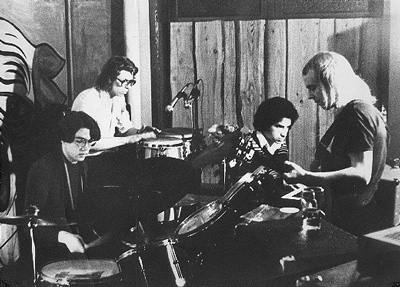
|
| Delay MK I & II |
|
The band's rehearsals took place at the garage of the Korstanje family home and most of the soundgear was "home-made", including a vacuum cleaner driven harmonium which made Hatfield's Dave Stewart sound like a recently converted Mantovani. The sometimes secret rehearsals at Michiel Groeneveld's (later a member of Autumn's Daughter) place in Diepenveen, near Deventer, can't be left unmentioned either: a great many musical ideas, plus countless, serious hangovers were conceived there.
Leendert left Delay in 1976 and soon met the still frightfully young Fred Rosenkamp in whom he found a very competent co-composer. Jan went off to explore the borders of the newly invented musical style of "Free Jazz" together with Hans Hulshof (bass) and Wolter Wierbos (trombone). Soon Hans and Jan discovered that they weren't really feeling comfortable in the genre of Free Jazz. Not long after they played at the Band competition of the Laren Jazzfestival, the three of them went their separate ways. Wolter became an internationally renowned player in the world of improvising musicians. Jan reunited with Willem Molenaar to form the second line-up of Delay together with Gert "Gino" Deters (percussion), Alex Rahangmetan (piano) and Bert van Heel (guitar). Apart from their own compositions, Delay II played music by Santana, Who, Bebop de Luxe, Camel and Kayak. |
 |
| In the meantime Leendert and Fred had formed a band with Eddy Bakker (bass) and Joop van Leeuwen (drums). Being not too much concerned about a new name for the band they -again- named it Lady Lake, actually because this name was still wellknown in Deventer. Lady Lake MKII found a wonderfully secluded spot to rehearse and devoted a few weeks of holidays to composing and rehearsing. |
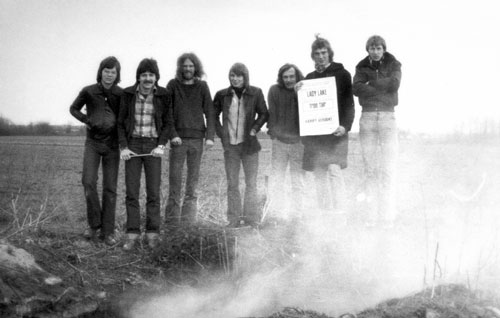 |
|
|
|
As always, Aart and Peter van de Water took care of the technical side of live gigs and rehearsals. One should realize that in those days P.A.-rental companies hadn't really started yet, so every band had to have its own sound- and lightgear. The band began to play a considerable number of gigs and soon had earned a great reputation as an exciting progressive rock band, playing complex but melodic instrumental music. By this time Hans Rosenkamp had become the band's manager - something a band just couldn't do without, they were told. |